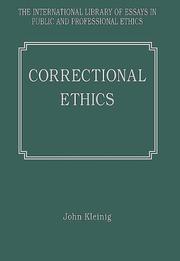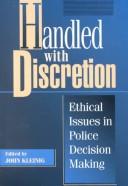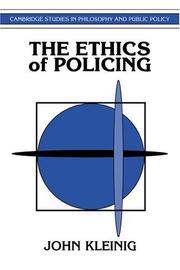| Listing 1 - 10 of 24 | << page >> |
Sort by
|
Book
ISBN: 0709915187 Year: 1982 Publisher: London
Abstract | Keywords | Export | Availability | Bookmark
 Loading...
Loading...Choose an application
- Reference Manager
- EndNote
- RefWorks (Direct export to RefWorks)
Teaching --- Pedagogiek en onderwijskunde --- fundamentele pedagogiek --- fundamentele pedagogiek. --- Fundamentele pedagogiek.

ISBN: 0754624315 9780754624318 9781315095387 9781351570923 Year: 2006 Publisher: [Lieu de publication inconnu]: [éditeur inconnu],
Abstract | Keywords | Export | Availability | Bookmark
 Loading...
Loading...Choose an application
- Reference Manager
- EndNote
- RefWorks (Direct export to RefWorks)
Professional ethics. Deontology --- Criminology. Victimology --- Corrections --- Punishment --- Correctional personnel --- Restorative justice. --- Moral and ethical aspects. --- Professional ethics. --- #SBIB:35H52 --- #SBIB:17H20 --- #SBIB:35H143 --- Balanced and restorative justice --- BARJ (Restorative justice) --- Community justice --- Restorative community justice --- Criminal justice, Administration of --- Reparation (Criminal justice) --- Correction officers --- Correctional employees --- Corrections employees --- Criminal justice personnel --- Correctional services --- Penology --- Ethiek van bestuur en beleid --- Sociale wijsbegeerte: algemeen --- Bijzondere korpsen: rechterlijke macht --- Restorative justice --- Professional ethics --- Moral and ethical aspects --- Corrections - Moral and ethical aspects. --- Punishment - Moral and ethical aspects. --- Correctional personnel - Professional ethics.

ISBN: 902471592X 9401020272 9789024715923 Year: 1973 Publisher: The Hague: Nijhoff,
Abstract | Keywords | Export | Availability | Bookmark
 Loading...
Loading...Choose an application
- Reference Manager
- EndNote
- RefWorks (Direct export to RefWorks)
Criminal law. Criminal procedure --- General ethics --- Punishment --- Punishment.
Book
ISBN: 0847672077 9780847672073 Year: 1984 Publisher: Totowa (N.J.): Rowman and Allanheld,
Abstract | Keywords | Export | Availability | Bookmark
 Loading...
Loading...Choose an application
- Reference Manager
- EndNote
- RefWorks (Direct export to RefWorks)
Paternalism --- Social aspects --- Case studies --- -Parentalism --- Social classes --- Social control --- Social systems --- -Case studies --- -Social aspects --- Parentalism --- Social aspects&delete& --- Paternalism - Social aspects - Case studies

ISBN: 9780521682831 9780521864206 0521864208 0521682835 9780511806155 0511806159 9780511649592 0511649592 110717841X 1282390074 0511645503 9786612390074 0511384122 0511573162 0511385951 9781282390072 9780511645501 6612390077 9780511384127 9780511573163 9780511385957 Year: 2008 Publisher: Cambridge : Cambridge University Press,
Abstract | Keywords | Export | Availability | Bookmark
 Loading...
Loading...Choose an application
- Reference Manager
- EndNote
- RefWorks (Direct export to RefWorks)
This textbook looks at the main ethical questions that confront the criminal justice system - legislature, law enforcement, courts, and corrections - and those who work within that system, especially police officers, prosecutors, defence lawyers, judges, juries, and prison officers. John Kleinig sets the issues in the context of a liberal democratic society and its ethical and legislative underpinnings, and illustrates them with a wide and international range of real-life case studies. Topics covered include discretion, capital punishment, terrorism, restorative justice, and re-entry. Kleinig's discussion is both philosophically acute and grounded in institutional realities, and will enable students to engage productively with the ethical questions which they encounter both now and in the future - whether as criminal justice professionals or as reflective citizens.
Criminal justice, Administration of --- Criminal law --- Moral and ethical aspects --- Moral and ethical aspects. --- Crime --- Crimes and misdemeanors --- Criminals --- Law, Criminal --- Penal codes --- Penal law --- Pleas of the crown --- Public law --- Criminal procedure --- Administration of criminal justice --- Justice, Administration of --- Law and legislation --- Legal status, laws, etc. --- Arts and Humanities --- Philosophy --- Criminal justice, Administration of - Moral and ethical aspects --- Criminal law - Moral and ethical aspects --- Criminal justice, Administration of - Moral and ethical aspects - Cases --- Criminal law - Moral and ethical aspects - Cases

ISBN: 0847681777 Year: 1996 Publisher: Lanham, MD : Rowman & Littlefield Publishing,
Abstract | Keywords | Export | Availability | Bookmark
 Loading...
Loading...Choose an application
- Reference Manager
- EndNote
- RefWorks (Direct export to RefWorks)
Police discretion --- Police ethics --- Congresses. --- Procédure pénale --- Discrimination raciale --- Police --- Pouvoir discretionnaire --- Sociologie des professions
Book
ISBN: 1921862572 1921862580 9781921862588 9781921862571 Year: 2011 Publisher: Canberra, Australia : ANU Press,
Abstract | Keywords | Export | Availability | Bookmark
 Loading...
Loading...Choose an application
- Reference Manager
- EndNote
- RefWorks (Direct export to RefWorks)
This study is principally concerned with the ethical dimensions of identity management technology - electronic surveillance, the mining of personal data, and profiling - in the context of transnational crime and global terrorism.
Social Welfare & Social Work --- Social Sciences --- Criminology, Penology & Juvenile Delinquency --- Terrorism --- Transnational crime --- Moral and ethical aspects. --- Political aspects. --- Multinational crime --- Transborder crime --- Crime
Book
ISBN: 0041700333 0041700325 Year: 1985 Publisher: London Allen and Unwin
Abstract | Keywords | Export | Availability | Bookmark
 Loading...
Loading...Choose an application
- Reference Manager
- EndNote
- RefWorks (Direct export to RefWorks)
Psychosurgery --- Bioethics. --- Ethics, Medical. --- Psychosurgery. --- Moral and ethical aspects.

ISBN: 0521484332 0521482062 1139172859 9780521484336 Year: 1996 Publisher: Cambridge : Cambridge university press,
Abstract | Keywords | Export | Availability | Bookmark
 Loading...
Loading...Choose an application
- Reference Manager
- EndNote
- RefWorks (Direct export to RefWorks)
This book is the most systematic, comprehensive and philosophically sophisticated discussion of police ethics yet published. It offers an in-depth analysis of the ethical values that police, as servants of the community, should uphold as they go about their task. The book considers the foundations and purpose of police authority in broad terms but also tackles specific problems such as accountability, the use of force, deceptive stratagems used to gain information or trap the criminally intentioned, corruption, and the tension between personal values and communal concerns. Offering the fullest, most rigorous and up-to-date treatment of police ethics currently available, this book will be a perfect textbook in courses on applied ethics in philosophy departments or police and criminal justice ethics in departments of criminology and law schools.
Police ethics. --- Policiers --- Police ethics --- Ethics, Police --- Ethics --- Déontologie --- Arts and Humanities --- Philosophy
Book
ISBN: 0691608008 0691073880 0691636508 1400862280 9781400862283 9780691073880 9780691636504 Year: 2014 Publisher: Princeton, NJ : Princeton University Press,
Abstract | Keywords | Export | Availability | Bookmark
 Loading...
Loading...Choose an application
- Reference Manager
- EndNote
- RefWorks (Direct export to RefWorks)
Abortion, euthanasia, capital punishment, war, genetic engineering and fetal experimentation, environmental and animal rights--these topics inspire some of today's most heated public controversies. And it is fashionable to pursue these debates in terms of the negative query "Under what conditions may life be disregarded or terminated?" John Kleinig asks a different, more positive question: What may be said in behalf of life? Looking at the full range of appeals to life's value, he considers a variety of issues. Is livingness as such to be affirmed and respected? Is there an ascending order of plant, animal, and human life? Does human life possess a distinctive claim, or must we discriminate between humans that do and humans that do not have claims on us? Kleinig shows that assertions about valuing life camouflage a complex normative vocabulary about worth, reverence, sanctity, dignity, respect, and rights. And "life," too, is subject to an assortment of understandings. Sensitive to the frameworks informing diverse appeals to life's value, this comprehensive work will interest readers concerned with the environment, animal rights, or bioethics.Originally published in 1991.The Princeton Legacy Library uses the latest print-on-demand technology to again make available previously out-of-print books from the distinguished backlist of Princeton University Press. These editions preserve the original texts of these important books while presenting them in durable paperback and hardcover editions. The goal of the Princeton Legacy Library is to vastly increase access to the rich scholarly heritage found in the thousands of books published by Princeton University Press since its founding in 1905.
Life. --- Life (Biology) --- Life (Biology). --- Biology --- Life --- Philosophy
| Listing 1 - 10 of 24 | << page >> |
Sort by
|

 Search
Search Feedback
Feedback About UniCat
About UniCat  Help
Help News
News